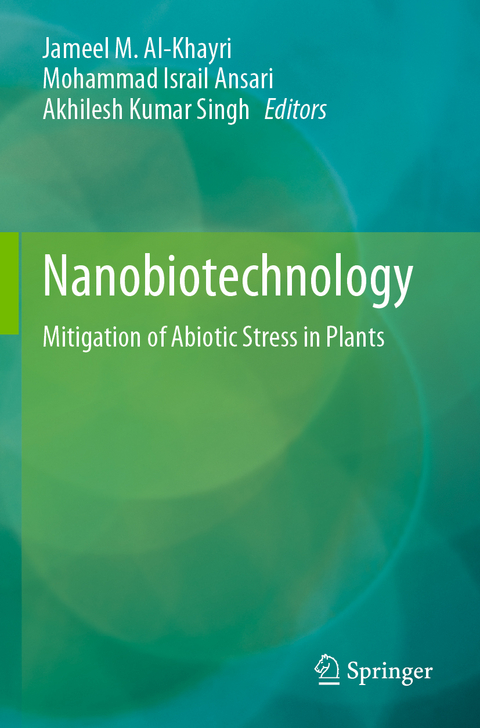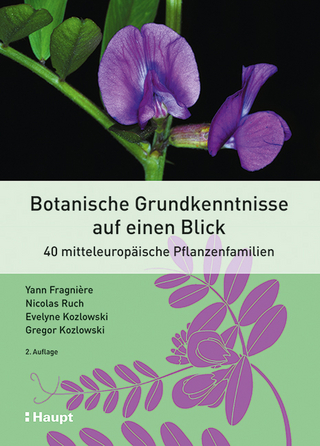
Nanobiotechnology
Springer International Publishing (Verlag)
978-3-030-73608-8 (ISBN)
This book provides up-to-date knowledge of the promising field of Nanobiotechnology with emphasis on the mitigation approaches to combat plant abiotic stress factors, including drought, salinity, waterlog, temperature extremes, mineral nutrients, and heavy metals. These factors adversely affect the growth as well as yield of crop plants worldwide, especially under the global climate change. Nanobiotechnology is viewed to revolutionize crop productivity in future.
The chapters discuss the status and prospects of this cutting-edge technology toward understanding tolerance mechanisms, including signaling molecules and enzymes regulation in addition to the applications of Nanobiotechnology to combat individual abiotic stress factors.
lt;p>Jameel M. Al-Khayri is Professor of plant biotechnology at the Department of Agricultural Biotechnology, College of Agriculture and Food Sciences, King Faisal University, Saudi Arabia. He obtained B.S. in Biology in 1984 from the University of Toledo, M.S. in Agronomy in 1988, and Ph.D. in Plant Science in 1991 from the University of Arkansas, USA. He dedicated his research efforts to date palm biotechnology for the last three decades. He published over 60 research articles and reviews in international journals in addition to 30 book chapters. He is Editor of several special issues of international journal on date palm, biotechnology, and sustainable agriculture under abiotic and biotic stress. He is Editor of 15 Springer reference books including Date Palm Biotechnology, Date Palm Genetic Resources and Utilization (2 volumes), Date Palm Biotechnology Protocols (2 volumes), and Advances in Plant Breeding Strategies (9 volumes). He is appointed as Member of the editorial board and reviewers panel in several international journals. He is participated in the organizing and scientific committees of international scientific conferences and contributed over fifty research presentations. In addition to teaching, graduate students advising and conducting funded research projects, he held administrative posts as Assistant Director of Date Palm Research Center, Head of Department of Plant Biotechnology, and Vice Dean for Development and Quality Assurance. He is Active Member of the International Society for Horticultural Science and Society for In Vitro Biology and serving as the National Correspondent of the International Association of Plant Tissue Culture and Biotechnology. He serves as Member of Majlis Ash Shura (Saudi Arabia Legislative Council) Fifth Session. Currently, he is maintaining an active research program on date palm focusing on genetic transformation, secondary metabolites, and in vitro mutagenesis to enhance tolerance to abiotic and biotic stress.
Dr. Mohammad Israil Ansari is Professor at Department of Botany, University of Lucknow, India. Before joining University of Lucknow, he was Professor at Amity Institute of Biotechnology, Amity University, Lucknow Campus, Lucknow (2007-2016). He has been graduated and post-graduated from Department of Botany, Aligarh Muslim University, Aligarh, India, and doctoral degree from Dr. Ram Manohar Lohia Avadh University, Faizabad, India. He is Academia Sinica Fellow from Government of Taiwan. He has more than 26 years of research and 15 years of teaching experience with more than 70 research papers, several books, book chapter, review articles, Ph.D., post-graduate summer projects as well as funded research projects to his credit. He has been associated with Institute of Botany, Academia Sinica, Taiwan; Graduate Institute of Plant Biology, National Taiwan University, Taiwan; and Institute of Plant and Microbial Biology, Academia Sinica, Taiwan (2000-2007). He has made significant contributions in the field of Molecular Biology of Leaf Senescence, Dehydration Stress, Red Rot Disease of Sugarcane, and Nanotechnology. Presently, he is working on GABA-Transaminase gene that plays a very important role in leaf senescence process and role of nanotechnology in plant stress conditions. He is Editorial Board Member of several international journals as well as Member of several academic board/faculty board/board of studies/research and development bodies. He has delivered several invited lecture at national and international level.
Dr. Akhilesh Kumar Singh is currently an Assistant Professor in the Department of Biotechnology, Mahatma Gandhi Central University, Motihari, Bihar, India. He has more than 12 years of teaching and multidisciplinary research experience in microbial physiology and industrial biotechnology. His research focus is on polyhydroxyalkanoate bioplastic production, metallic nanobiotechnology, nitric oxide signaling, and biofuel production
Abiotic Stress in Plants: Socio-economic Consequences and Crop Plants Responses.- Plant Abiotic Stress Tolerance Mechanisms.- Biotechnology Strategies to Combat Plant Abiotic Stress.- Nanomaterials Fundamentals: Classification, Synthesis and Characterization.- Utilization of Nanobiotechnology in Modern Agriculture.- Contributions of Nano Biosensors in Managing Environmental Stresses under Climate Change Era.- Utilization of Nanobiotechnology to Alleviate Impact of Abiotic Stress in Crop Plants.- Green Synthesis of Nanoparticles Using Different Plant Extracts and their Characterizations.- Applications of Plant-Derived Nanomaterials in Mitigation of Crop Abiotic Stress.- Biosynthesis and Characterization of Microorganisms-Derived Nanomaterials.- Utilization of Nanofertilizers in Plant Tolerance to Abiotic Stress.- Role of Nanomaterials in Regulating Reactive Species as a Signaling Molecule of Abiotic Stress.- Role of Nanomaterials in Regulating Oxidative Stress.- Plant Stress Enzymes Nanobiotechnology.- Plant Stress Hormones Nanobiotechnology.- Effect of Nanoparticle on Plant Growth and Development.- Application of Nanobiotechnology in Overcoming Salinity Stress.- Application of Nanobiotechnology in Overcoming Drought Stress.- Application of Nanobiotechnology in Overcoming Temperature Stress.- Application of Nanobiotechnology in Overcoming Mineral Nutrients Stress.- Nanomaterials Combat Heavy Metals Toxicity by Modulating Oxidative Stress Pathways in Plants.- Nanonutrients: Plant Nutritive and Possible Antioxidant Regulators.- Impact of Nanomaterials Stress on Plants.- Biosafety of Nanomaterials for Plants to Coup with Stress Conditions.- Nanomaterials in Combating Plant Stress: An Approach for Future Applications.
| Erscheinungsdatum | 26.07.2022 |
|---|---|
| Zusatzinfo | XVII, 590 p. 98 illus., 88 illus. in color. |
| Verlagsort | Cham |
| Sprache | englisch |
| Maße | 155 x 235 mm |
| Gewicht | 907 g |
| Themenwelt | Naturwissenschaften ► Biologie ► Botanik |
| Weitere Fachgebiete ► Land- / Forstwirtschaft / Fischerei | |
| Schlagworte | abiotic stress • nanobiotechnology • nanomaterials • Oxidative stress • Signaling molecule |
| ISBN-10 | 3-030-73608-3 / 3030736083 |
| ISBN-13 | 978-3-030-73608-8 / 9783030736088 |
| Zustand | Neuware |
| Informationen gemäß Produktsicherheitsverordnung (GPSR) | |
| Haben Sie eine Frage zum Produkt? |
aus dem Bereich


